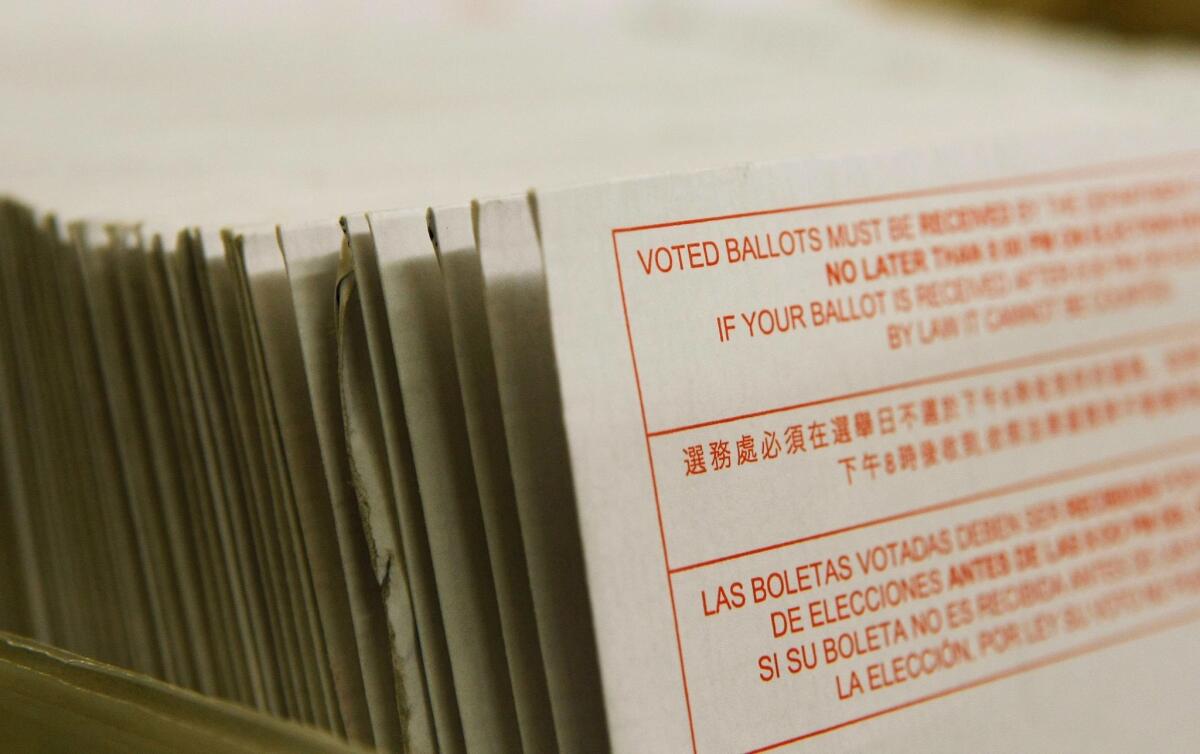Column: Political Road Map: Election day has become election month in California

- Share via
There’s a good chance that millions of Californians who receive a ballot in the mail this month will leave it sitting on a table for days or weeks, deciding for whatever reason to delay casting their vote in the Nov. 8 election.
That may not seem like a big deal until you consider that absentee voters are now in the majority in the state, a shift in voting habits that’s part of what may be a major political evolution.
The result is that candidates and strategists can now repeatedly tweak their efforts by tracking the daily tally of which voters turn in ballots — sometimes recalibrating for as little as 20% of voters, all to squeeze out every last drop of support.
“Campaigns have been doing this more and more each year,” said Paul Mitchell, whose company Political Data, Inc. sifts and sorts stacks of information on the state’s electorate.
California voters, it turns out, generally fall into one of three groups: Those who return ballots more than 10 days before the election; those whose hand in the ballot during the final 10 days; and those who vote at the polls or turn their absentee ballot in on election day.
Political professionals treat each of those groups as a separate effort, a new variation on the trend toward micro-targeting. But those are no longer just efforts about who you are, said Mitchell, it’s also a function of when you vote.
“Campaigns are now treating time as a factor just like race or ethnicity,” he said. “And that’s totally new.”
Those groups of early or late voters can be cross-referenced with Facebook accounts or IP addresses as campaigns zero in on digital ads. And in addition to being more focused, it’s cheaper. Targeting just a fraction of your voters with online ads costs less than trying to plaster the message everywhere.
That might be one reason Hillary Clinton this week pointedly noted the start of early voting in the Golden State.
Sign up for our daily Essential Politics newsletter »
But even armed with all of that data, it’s still a bit of a mystery why so many Californians who cast ballots sitting at home or in a coffee shop wait so long.
And few elections, say campaign consultants, have proved more vexing than this one. Led by the most caustic presidential campaign in modern history and a lackluster U.S. Senate race, there’s healthy debate about which Californians will be more — or less — motivated to vote.
For example, will voters in a Republican-dominated congressional district that didn’t vote for Donald Trump in the June primary simply sit this one out? If so, would Democratic causes suddenly gain an advantage?
And then there’s the very long ballot, in many cases one that’s full of local measures stacked on top of 17 statewide propositions.
“The more complex the ballot, the ballots are turned in later,” Mitchell said.
Your ballot box guide to California’s 17 propositions »
These trends are likely to grow even more important in 2018, when a new law signed by Gov. Jerry Brown kicks in that’s designed to bring sweeping changes to the state’s election system. For the first time, counties will be able to close neighborhood polling places and instead mail everyone a ballot. Local officials will be able to focus more on election services — including same-day registration — and less on physical places to vote.
That will mean even more ballots in the mail, and possibly more political procrastination. It’s the kind of change that explains why political insiders now point out that in California, election day is being replaced by an election month.
Follow @johnmyers on Twitter, sign up for our daily Essential Politics newsletter and listen to the weekly California Politics Podcast
ALSO:
More Californians will vote by mail under a new law signed by Gov. Jerry Brown
Your ballot box guide to California’s 17 propositions
Political Roadmap: Don’t expect big changes if Democrats win a supermajority in the Legislature
Updates on California politics
More to Read
Get the L.A. Times Politics newsletter
Deeply reported insights into legislation, politics and policy from Sacramento, Washington and beyond. In your inbox twice per week.
You may occasionally receive promotional content from the Los Angeles Times.











